Vietnam, an S-shaped strip of land stretching from North to South, is not only famous for its beautiful natural landscapes but also as the cradle of a rich and unique national culture. Within this cultural treasure, traditional festivals play an extremely important role, serving as a convergence of cultural essence, beliefs, and history of 54 brotherly ethnic groups. Each festival is a revival of unique cultural values, an opportunity for people to remember the merits of their ancestors and pray for a prosperous and happy life. Join “Discovery Around the World” to explore the top traditional festivals of Vietnam, promising to bring you unforgettable cultural experiences.
1. Hung Kings Temple Festival – National Ancestral Festival
The Hung Kings Temple Festival, also known as Hung Kings Commemoration Day, is one of the most nationally significant traditional festivals in Vietnam. Held annually on the 10th day of the 3rd lunar month at the Hung Kings Temple historical site in Viet Tri city, Phu Tho province, the festival is an occasion for the entire Vietnamese nation to look back to its roots, remember, and express gratitude for the nation-building merits of the Hung Kings. The Hung Kings worship belief is not only a beautiful spiritual cultural feature but is also recognized by UNESCO as a Representative Intangible Cultural Heritage of Humanity.
During the festival days, a solemn and respectful atmosphere pervades Hung Kings Temple. Before the main festival day, the festival section takes place with many unique folk cultural activities such as palanquin processions, xoan singing, wrestling, tug-of-war, and traditional folk games. On the main festival day, the 10th day of the 3rd lunar month, a solemn incense offering ceremony is held at the Upper Temple, considered the center of the Hung Kings worship belief. Millions of people from all over the country and overseas Vietnamese compatriots flock to Hung Kings Temple to express their gratitude and pray for national prosperity and peace.
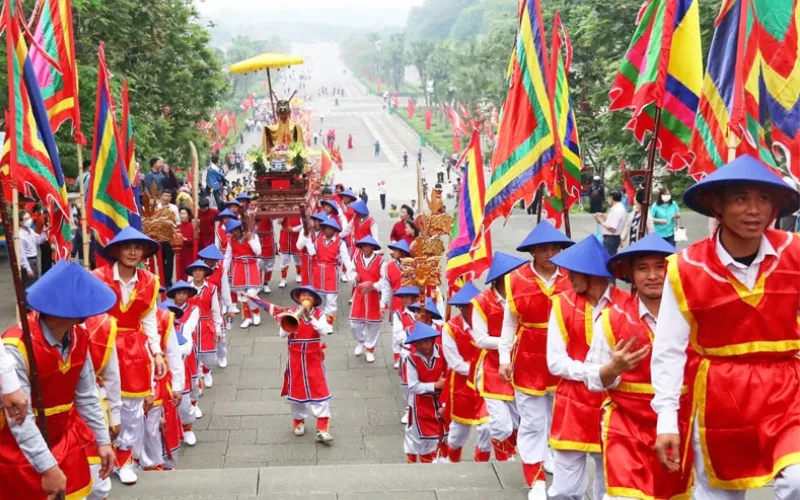
2. Lim Festival – Captivating Quan Ho Folk Songs in Early Spring
Lim Festival is one of the largest and most famous traditional festivals in the Kinh Bac region, now Bac Ninh province. Taking place from the 12th to the 14th day of the first lunar month annually, Lim Festival is an opportunity for visitors to immerse themselves in the unique Quan Ho culture, with sweet and soulful melodies. Lim Festival is not only a spring festival but also an occasion for people to remember the merits of their predecessors and educate future generations about the nation’s good cultural traditions.
The highlight of Lim Festival is the smooth Quan Ho melodies, performed on dragon boats in the middle of the lake, on Lim Hill, and at Quan Ho camps. Visitors can enjoy folk songs, proverbs, and love duets between “lien anh” (male singers) and “lien chi” (female singers). In addition, Lim Festival also features many attractive folk games such as swinging, wrestling, human chess, blindfolded goat catching, creating a joyful and bustling atmosphere. Coming to Lim Festival, visitors not only get to listen to Quan Ho singing but also experience a unique festival cultural space, imbued with the essence of Northern Vietnam.
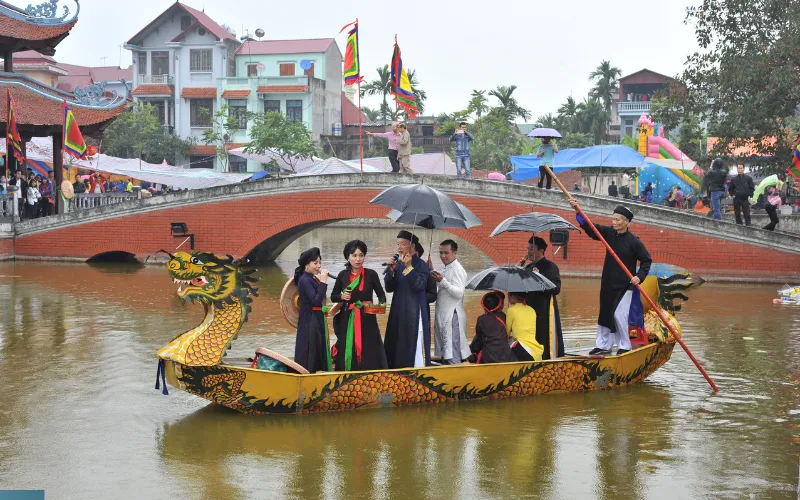
3. Tran Temple Festival, Nam Dinh – Recreating the Heroic Spirit of the Tran Dynasty
Tran Temple Festival in Nam Dinh is an important traditional festival, held from the 15th to the 20th day of the 8th lunar month annually at the Tran Temple historical site, Loc Vuong ward, Nam Dinh city. The festival is held to commemorate the merits of the 14 Tran kings, who made great contributions to building and defending the country. Tran Temple Festival is not only an occasion to pay tribute to ancestors but also an opportunity for visitors to explore the unique architecture of Tran Temple and immerse themselves in the sacred festival atmosphere.
The most distinctive feature of Tran Temple Festival is the seal opening ceremony, taking place on the night of the 14th and the early morning of the 15th day of the first lunar month. This ceremony symbolizes the wish for national prosperity and peace, and for everyone to receive the seal of fortune from the Tran Dynasty. In addition, the festival also has many traditional cultural activities such as palanquin processions, rituals, lion dances, cheo singing, and folk games. Visitors to Tran Temple Festival not only admire the ancient architecture but also feel the solemn, sacred atmosphere and learn more about the nation’s heroic history.
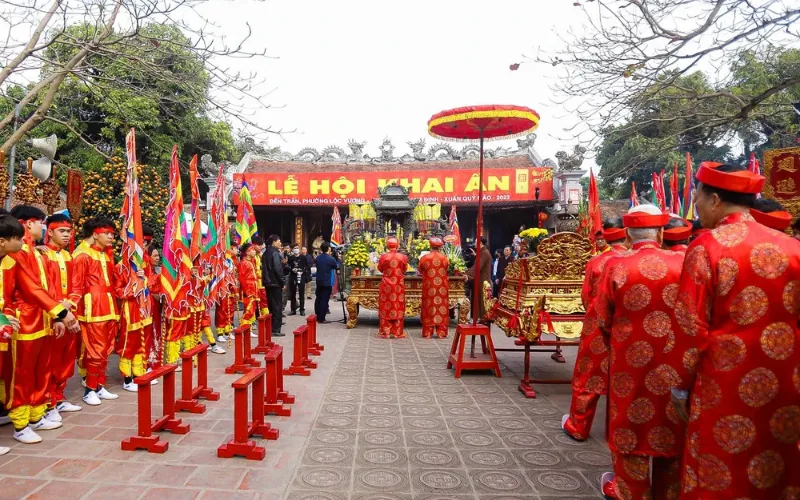
4. Giong Festival – Reenacting the Legend of Saint Giong, Phu Dong Thien Vuong
Giong Festival is one of the most unique and distinctive traditional festivals of the Northern Delta region, commemorating Saint Giong, the “immortal” saint in Vietnamese folk beliefs. Giong Festival is not only a festival imbued with historical and cultural elements but is also recognized by UNESCO as a Representative Intangible Cultural Heritage of Humanity. The main festival is held on the 8th and 9th days of the 4th lunar month annually at Phu Dong Temple (Gia Lam, Hanoi) and Soc Temple (Soc Son, Hanoi).
Giong Festival vividly and grandly reenacts the legend of Saint Giong fighting against the An invaders. The rituals and activities in the festival are prepared and performed elaborately and meticulously, showing the martial spirit and patriotism of the nation. The highlight of Giong Festival is the processions, performances simulating the battle of Saint Giong and the invaders, attracting a large number of people and tourists to participate. Giong Festival is not only a fun festival but also a “living museum” of Vietnamese culture, history, and beliefs.
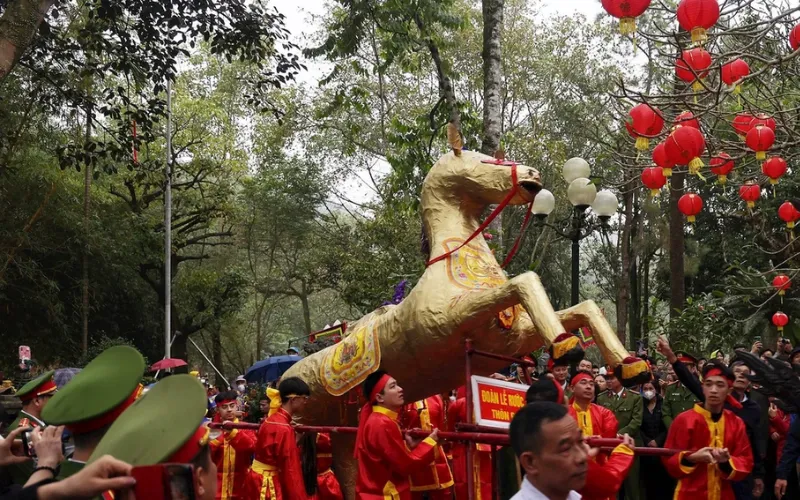
5. Long Tong Festival of the Tay People – Praying for Bumper Crops
Long Tong Festival, also known as the Going-to-the-Fields Festival, is an important traditional festival of the Tay ethnic group, usually held at the beginning of the new year to pray for a year of favorable weather, bumper crops, and a prosperous and happy life. Long Tong Festival is not only a cultural and religious activity but also an opportunity for communities of Tay, Nung, Dao, San Chi ethnic groups… to giao lưu, connect, and show their unique cultural identities.
The time of holding Long Tong Festival is not fixed but depends on each locality, usually taking place around January or February of the lunar calendar. In Chiem Hoa (Tuyen Quang), the festival is usually held on the 8th day of the first lunar month. The festival includes many traditional rituals such as worshiping deities, praying for crops, and folk cultural activities such as then singing, khen dancing, and playing folk games. The highlight of the festival is the going-to-the-fields ritual, showing the close connection between humans and nature, and sending wishes for a prosperous and peaceful life.
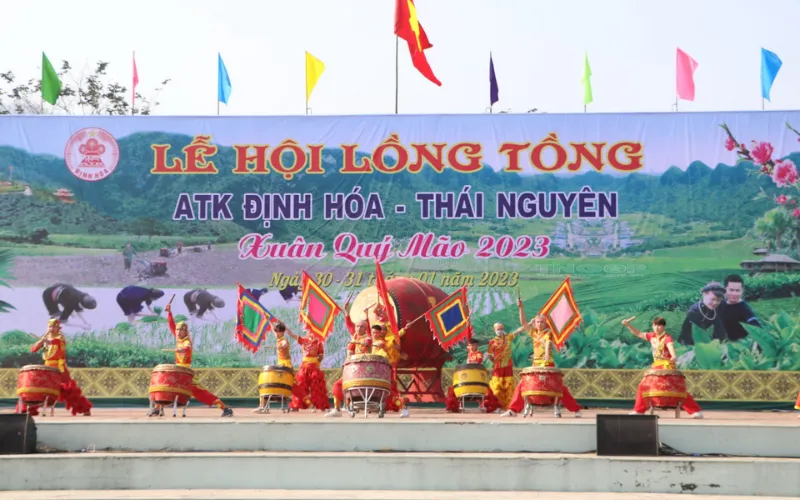
6. Ponagar Tower Festival, Nha Trang – Honoring the Mother Goddess of the Incense Land
Ponagar Tower Festival in Nha Trang is a unique traditional festival of Khanh Hoa province, taking place from the 20th to the 23rd day of the 3rd lunar month annually at the Ponagar Tower relic, Nha Trang city. The festival is held to honor Ponagar Tower, a cultural and religious symbol of the ancient Cham Pa people, and also the embodiment of the Mother Goddess in Vietnamese folk beliefs. Ponagar Tower Festival is not only an occasion to commemorate the merits of the Tower Goddess but also an opportunity to preserve and promote the traditional cultural values of the nation.
Ponagar Tower Festival includes many solemn rituals such as palanquin processions, Mother Goddess worshiping ceremonies, prayers for national prosperity and peace, and unique cultural and artistic activities such as umbrella dance, boi singing, and tuong performances. Visitors to the festival not only admire the unique architecture of Ponagar Tower but also immerse themselves in the colorful festival cultural space, imbued with Cham Pa and Vietnamese identities. Ponagar Tower Festival is an attractive spiritual cultural destination, attracting a large number of domestic and international tourists.
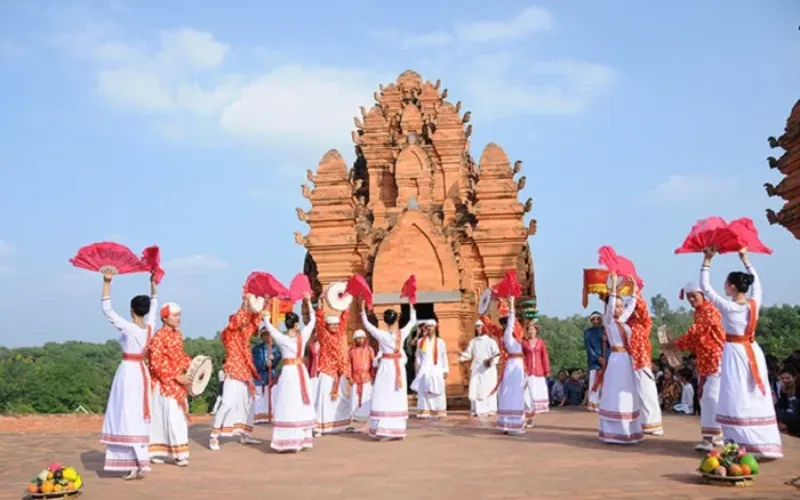
7. Nghinh Ong Festival, Can Gio – Unique Coastal Culture
Nghinh Ong Festival in Can Gio is a unique traditional festival of fishermen in the coastal area of Can Gio, Ho Chi Minh City. Held on the full moon day of the 8th lunar month annually, the festival is organized to honor “Lord Whale”, also known as the Southern Sea General, the patron saint of fishermen at sea. Nghinh Ong Festival is not only a folk belief but also a community cultural activity, connecting the people of the coastal village.
The highlight of Nghinh Ong Festival is the Nghinh Ong ritual at sea, with a solemn procession of boats carrying the Whale God, along with worshiping ceremonies, boi singing, and folk games. The festival attracts a large number of locals and tourists from all over to participate, creating a joyful and bustling atmosphere. Nghinh Ong Festival in Can Gio is not only a festival occasion but also a unique cultural tourism product, contributing to promoting the image of Can Gio to domestic and international tourists.
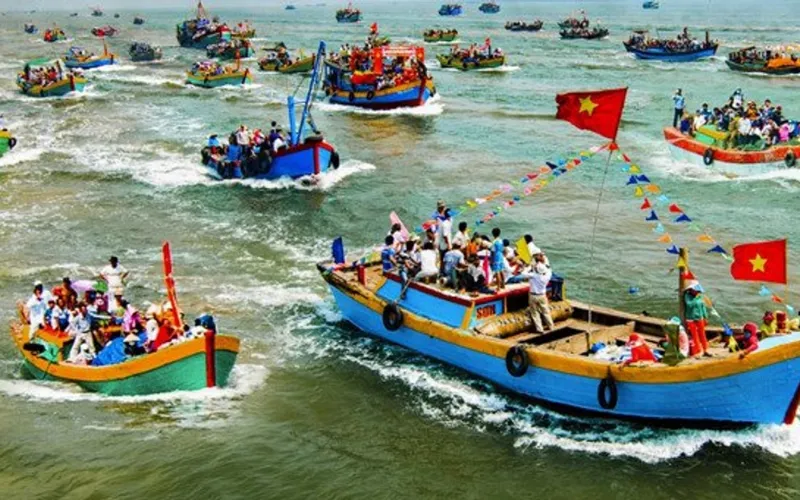
8. Ba Chua Xu Temple Festival, Sam Mountain – Top Spiritual Destination in the Mekong Delta
Ba Chua Xu Temple Festival at Sam Mountain is one of the largest and most famous traditional festivals in the Mekong Delta region, taking place from the night of the 23rd to the end of the 27th day of the 4th lunar month annually at Ba Chua Xu Temple, at the foot of Sam Mountain, Chau Doc, An Giang. The festival is held to honor Ba Chua Xu, the goddess believed by locals to bring luck, peace, and fortune. Ba Chua Xu Temple is a famous spiritual tourist destination, attracting millions of pilgrims every year.
Ba Chua Xu Temple Festival includes many traditional rituals such as the Goddess bathing ceremony, the Goddess procession ceremony, the Goddess worshiping ceremony, and folk cultural activities such as boi singing, lion dances, and folk games. A special feature of the festival is the ritual of inviting the Goddess and bathing the Goddess, performed by villagers according to ancient rituals. Ba Chua Xu Temple Festival is not only a festival occasion but also an important spiritual cultural activity of the Mekong Delta people, expressing reverence and aspirations for a better life.
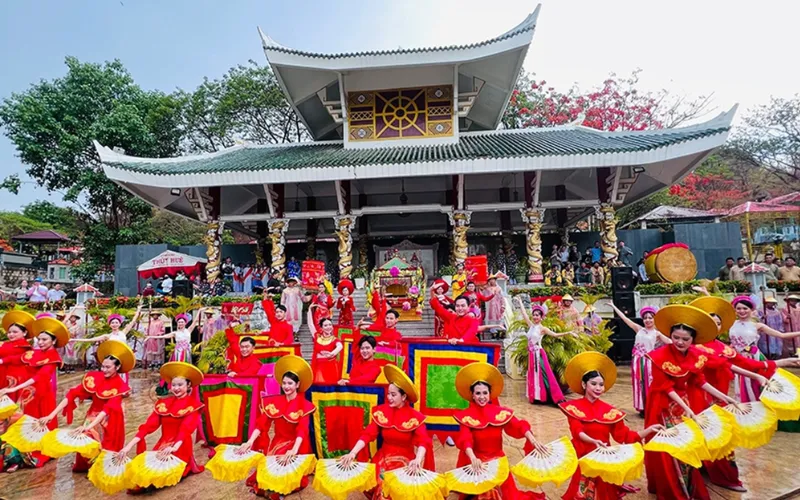
9. Hoa Lu Festival, Ninh Binh – Returning to the Ancient Capital of a Thousand Years of Civilization
Hoa Lu Festival in Ninh Binh, also known as Truong Yen festival or Co Lau festival, is a traditional festival imbued with historical values, held at the beginning of the 3rd lunar month annually at Hoa Lu Ancient Capital, Ninh Binh. The festival is held to commemorate the merits of two emperors, Dinh Tien Hoang and Le Dai Hanh, who made great contributions to building and defending the country in the 10th century. Hoa Lu Festival is not only an occasion to pay tribute to history but also an opportunity for visitors to explore the beauty of Hoa Lu Ancient Capital and learn about the nation’s traditional cultural values.
Hoa Lu Festival includes many solemn rituals such as palanquin processions, worshiping ceremonies, and folk cultural activities such as cheo singing, lion dances, and folk games. The festival is imbued with historical, cultural, and folk religious colors, recreating the heroic atmosphere of the Dinh – Le period. Visitors to Hoa Lu Festival not only visit historical relics but also immerse themselves in the traditional festival space, feeling the cultural and historical depth of the nation.

10. Perfume Pagoda Festival – Pilgrimage to the Buddhist Land
Perfume Pagoda Festival is one of the largest and longest traditional festivals in the North, taking place from January to March of the lunar calendar annually at Perfume Pagoda, Huong Son commune, My Duc district, Hanoi. Perfume Pagoda is not only a famous spiritual tourist destination but also a beautiful scenic spot, attracting a large number of tourists to pilgrimage and sightsee. Perfume Pagoda Festival is an opportunity for everyone to return to the Buddhist land, pray for peace, luck, and immerse themselves in the peaceful natural space.
Perfume Pagoda Festival includes many unique religious and cultural activities such as the opening ceremony, incense offering ceremony, palanquin procession ceremony, and folk cultural activities such as cheo singing, chau van singing, mountain climbing, and boat trips. Visitors to Perfume Pagoda Festival not only offer incense and pray but also explore the majestic natural beauty, the picturesque mountains and rivers of Huong Son, and experience the unique traditional cultural features of this land. Perfume Pagoda Festival is an attractive spiritual and cultural destination, bringing visitors unforgettable experiences.
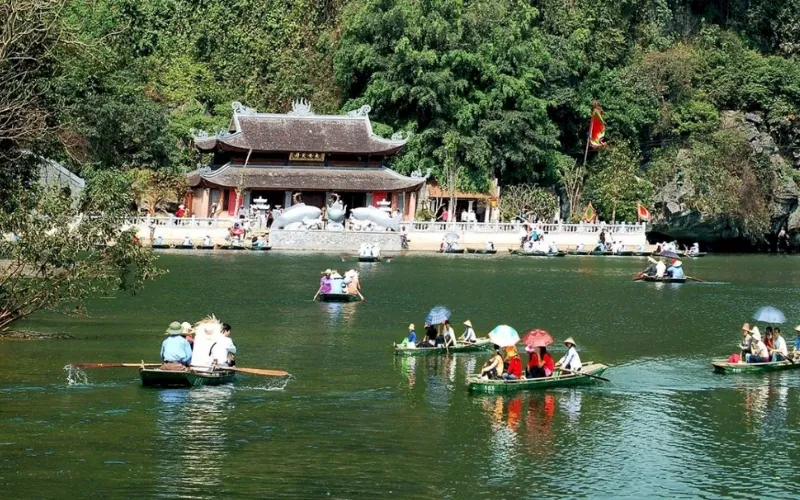
Conclusion:
Vietnam, with its long history and culture, possesses countless unique traditional festivals, each festival carrying its own beauty and meaning. The top 10 traditional festivals of Vietnam introduced above are just a small part of the country’s rich festival cultural treasure. Hopefully, through this article, readers will have more useful information and inspiration to explore and experience the unique cultural beauties of Vietnam through traditional festivals. Plan your journey to explore Vietnamese culture and don’t forget to visit these unique festivals for memorable experiences!